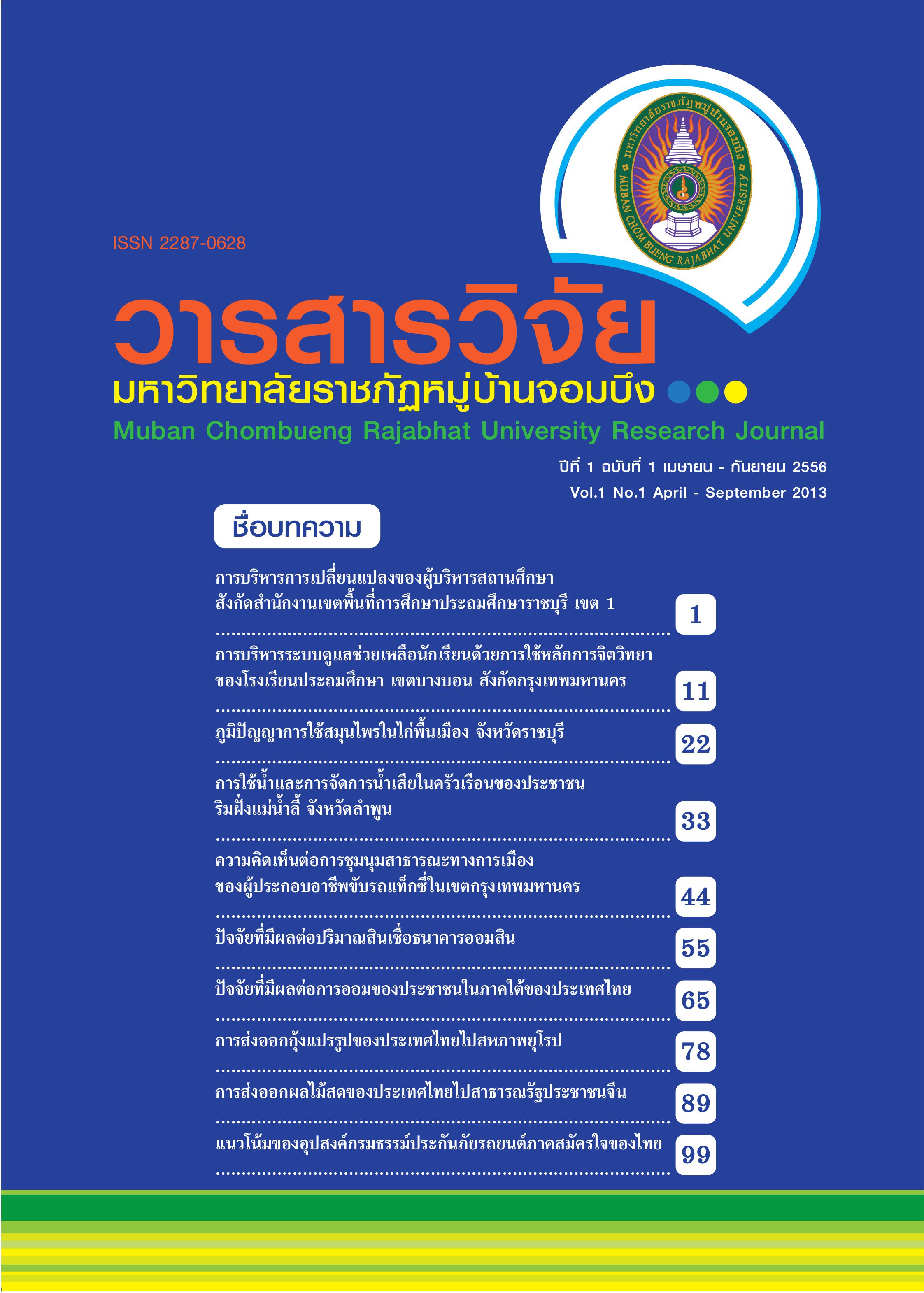การบริหารระบบดูแลช่วยเหลือนักเรียนด้วยการใช้หลักการจิตวิทยา ของโรงเรียนประถมศึกษา เขตบางบอน สังกัดกรุงเทพมหานคร
คำสำคัญ:
การบริหาร, ระบบดูแลช่วยเหลือนักเรียน, การใช้หลักจิตวิทยาบทคัดย่อ
การวิจัยครั้งนี้มีวัตถุประสงค์ 1) ศึกษาระดับปฏิบัติงานการบริหารระบบดูแลช่วยเหลือนักเรียนด้วยการใช้หลักจิตวิทยาของโรงเรียนประถมศึกษา เขตบางบอน สังกัดกรุงเทพมหานคร 2) เปรียบเทียบระดับปฏิบัติงานการบริหารระบบดูแลช่วยเหลือนักเรียนด้วยการใช้หลักการจิตวิทยาของโรงเรียนประถมศึกษา เขตบางบอน สังกัดกรุงเทพมหานคร 3) ศึกษาปัญหาและข้อเสนอแนะการบริหารระบบดูแลช่วยเหลือนักเรียนด้วยการใช้หลักจิตวิทยาของโรงเรียนประถมศึกษา เขตบางบอน สังกัดกรุงเทพมหานครกลุ่มตัวอย่าง ได้แก่ ผู้บริหารและครู จำนวน 180 คน เครื่องมือที่ใช้เป็นแบบสอบถาม โดยมีค่าความเชื่อมั่น 0.95 สถิติที่ใช้ ได้แก่ ค่าร้อยละ ค่าเฉลี่ย ค่าเบี่ยงเบนมาตรฐาน และการทดสอบค่าที
ผลการศึกษาพบว่า 1) ระดับปฏิบัติงานการบริหารระบบดูแลช่วยเหลือนักเรียนด้วยการใช้หลักจิตวิทยาผู้บริหารและครูตามความคิดเห็นของผู้บริหารและครู โรงเรียนประถมศึกษาในภาพรวมอยู่ในระดับมากที่สุด 2) การเปรียบเทียบระดับปฏิบัติงานการบริหารระบบดูแลช่วยเหลือนักเรียนด้วยการใช้หลักจิตวิทยาผู้บริหารและครูตามความคิดเห็นของผู้บริหารและครูจำแนกตามเพศมีความคิดเห็นไม่แตกต่างกัน การเปรียบเทียบระดับปฏิบัติงานการบริหารระบบดูแลช่วยเหลือนักเรียน ความคิดเห็นของผู้บริหารและครูจำแนกตามอายุมีความคิดเห็นแตกต่างกันอย่างมีนัยสำคัญทางสถิติที่ระดับ .05 การเปรียบเทียบระดับปฏิบัติงานการบริหารระบบดูแลช่วยเหลือนักเรียนด้วยการใช้หลักจิตวิทยา ตามความคิดเห็นของผู้บริหารและครูจำแนกตามวุฒิการศึกษามีความคิดเห็นไม่แตกต่างกัน การเปรียบเทียบระดับปฏิบัติงานการบริหารระบบดูแลช่วยเหลือนักเรียนด้วยการใช้หลักจิตวิทยาตามความคิดเห็นของผู้บริหารและครู จำแนกตามระยะเวลาการปฏิบัติงานมีความคิดเห็นไม่แตกต่างกัน 3) ปัญหาการบริหารระบบดูแลช่วยเหลือนักเรียนด้วยการใช้หลักจิตวิทยาคือ ขาดความร่วมมือกันระหว่างผู้บริหาร ครู และผู้ปกครอง และการเข้าถึงข้อมูลนักเรียนยังขาดข้อมูลเชิงลึก
เอกสารอ้างอิง
คณะกรรมการการศึกษาขั้นพื้นฐาน, สำนักงาน. (2546). ผู้บริหารสถานศึกษาขั้นพื้นฐานกับการแนะแนว. กรุงเทพมหานคร:กรมวิชาการ.
จันทณา บุญรุ่ง. (2548). การศึกษาบทบาทและปัญหาการปฏิบัติงานระบบการดูแลช่วยเหลือนักเรียนของผู้บริหารครูที่ปรึกษาและครูแนะแนวในโรงเรียนนำร่อง สังกัดสำนักงานคณะกรรมการการศึกษาขั้นพื้นฐาน. ปริญญานิพนธ์การศึกษามหาบัณฑิต กรุงเทพมหานคร: บัณฑิตวิทยาลัย มหาวิทยาลัยศรีนครินทรวิโรฒ.
นิภา เมธาวีชัย. (2543). การวัดและประเมินผล. กรุงเทพมหานคร.
บุญชม ศรีสะอาด. (2541). การวิจัยเบื้องต้น. พิมพ์ครั้งที่ 4. กรุงเทพมหานคร: สุวีริยาสาสน. ยุทธศาสตร์การศึกษา. กรุงเทพมหานคร : สำนักงานพระพุทธศาสนาแห่งชาติ. สำนักการศึกษา, สำนักงาน.
(2549). กิจกรรมแนะแนว
วิชาการ, กรม. (2545). คู่มือการบริหารจัดการแนะแนว. กรุงเทพมหานคร: กรมวิชาการ.
วิชาการ, กรม. (2546). ผู้บริหารสถานศึกษาขั้นพื้นฐานกับการแนะแนว. กรุงเทพมหานคร: กรมวิชาการ.
วีระ โอบอ้อม. (2549). การบริหารจัดการระบบดูแลช่วยเหลือนักเรียนในสถานศึกษาขั้นพื้นฐาน อำเภอบ้านลาด สังกัดสำนักงานเขตพื้นที่การศึกษาเพชรบุรี เขต 2. สารนิพนธ์ปริญญาศึกษามหาบัณฑิต กรุงเทพมหานคร : บัณฑิตวิทยาลัย มหาวิทยาลัยศรีนทรวิโรฒ.
วิโรจน์ สุรสาคร. (2550). การดำเนินงานระบบการดูแลช่วยเหลือนักเรียนในสถานศึกษา สังกัดเทศบาลนครปฐม. ปริญญาศึกษาศาสตรมหาบัณฑิต จังหวัดนครปฐม: บัณฑิต วิทยาลัย มหาวิทยาลัยศิลปากร.
ชัชวาลย์ บุญเหลี่ยม. (2552). การนำเสนอรูปแบบการพัฒนาระบบสารสนเทศเพื่อการบริหารระบบดูแลช่วยเหลือนักเรียน โรงเรียนนิคมสร้างตนเอง 6 สังกัดสำนักงานเขตพื้นที่การศึกษาอุบลธานีเขต 3. ปริญญานิพนธ์การศึกษามหาบัณฑิต จังหวัดอุบลราชธานี :บัณฑิตวิทยาลัยมหาวิทยาลัยราชภัฏอุบลราชธานี.
สังคม แก้วสว่าง (2547). การพัฒนาระบบการดูแลช่วยเหลือนักเรียนโรงเรียนเสสะเวชวิทยา. สารนิพนธ์ กศ.ม. (การบริหารการศึกษา) กรุงเทพมหานคร: บัณฑิตวิทยาลัย มหาวิทยาลัยศรีนครินทรวิโรฒ.
Krejcie, R.V. & Morgan, D.W. (1970). Determining sample size for research activities. Education and Psychological Measurement, 30 (3), 607-608).
ดาวน์โหลด
เผยแพร่แล้ว
รูปแบบการอ้างอิง
ฉบับ
ประเภทบทความ
สัญญาอนุญาต
วารสาร TCI อยู่ภายใต้การอนุญาต Creative Commons Attribution-NonCommercial-NoDerivatives 4.0 International (CC BY-NC-ND 4.0) เว้นแต่จะรุบุไว้เป็นอย่างอื่นโปรดอ่านหน้านโยบายของเราสำหรับข้อมูลเพิ่มเติมเกี่ยวกับการเช้าถึงแบบเปิด ลิขสิทธิ์ และการอนุญาต



